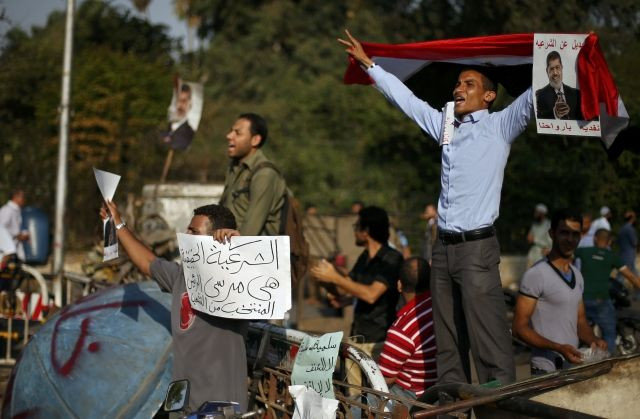Both Pro- And Anti-Morsi Forces Continue Rallies In Cairo; ElBaradei Appointment By Egyptian Military Called Off

Thousands of Mohamed Morsi supporters protested outside the ousted Egyptian president’s place of detention in Cairo Sunday while the military’s bid to resolve the political crisis remained mired in mistrust and confusion.
Demonstrators at the Republican Guard barracks, where three people were killed on Friday, shouted "Morsi, Morsi, God is greatest!" and "Peaceful, peaceful!" as soldiers and policemen looked on from behind barbed wire, Reuters reported. Morsi was last known to be held prisoner there, although his whereabouts were not certain Sunday.
"We will not leave until Morsi returns. Otherwise we'll die as martyrs," said Hanim Ahmad Ali Al-Sawi, wearing a veil over her face in the searing midday sun. "This was a coup against democracy."
The military said troops are beefing up security and warned against any "provocative actions." Any violators will be "dealt with decisively, under the law," the army spokesman said in an official Facebook posting. In Friday's violence it sided with the anti-Morsi crowds and in one case, opened fire on pro-Morsi demonstrators.
Anti-Morsi protesters trickled into Tahrir Square throughout the afternoon, and opposition leaders said they were planning for larger protests to begin that evening, The Wall Street Journal reported. Leaders from the Tamarod (Rebel) campaign, the signature-gathering campaign that started the movement to oust the president two months ago, urged Egyptians on Saturday to remain in city squares throughout the country on Sunday to "confirm that this is not a coup."
As the sun began to set, significant crowds from both camps began to assemble rapidly at their respective demonstrations. At Tahrir, crowds cheered as military helicopters flew over the square.
The transitional authorities had been set to appoint liberal politician and former U.N. nuclear watchdog Mohamed ElBaradei, a favorite of anti-Morsi protest leaders, before his candidacy was thrown into doubt when a hard-line Islamist party objected.
The abrupt U-turn due to opposition from the Salafist Nour Party, Egypt's second Islamist force after Morsi’s Muslim Brotherhood, highlighted the challenge the military faces in finding consensus on who should run the country and what direction they should lead it in.
Meanwhile, state media reported that the public prosecutor had ordered four top Brotherhood leaders arrested this week to be detained for a further 15 days on accusations of inciting violence against protesters.
The Brotherhood has rejected cooperating with the military's plans for a new interim government. It wants Morsi reinstated and has pledged to keep protesting until he is.
The Nour Party, the Brotherhood's rival for the Islamist vote, had agreed to the army-backed transition plan leading to new elections. Its withdrawal from the process would strip that plan of Islamist legitimacy.
In a Facebook posting Sunday, the Brotherhood's supreme leader Mohammed Badie said the "leaders of the unconstitutional coup continue flagrant violations against the Egyptian people," Fox News reported.
Since Morsi's removal Wednesday night, several of the Brotherhood's top figures were detained and the group's TV station and newspaper were shut down, as were three other pro-Morsi Islamist television stations. Among those detained is Badie's deputy Khairat el-Shater, seen as the most powerful figure in the group and its main decision-maker.
The U.S. Embassy in Cairo will be closed to the public Monday, and regular consular services are suspended for the day, the embassy announced Sunday.
“There is the possibility of protests today in vicinity of the embassy, and crowds continue to increase this afternoon in nearby Tahrir Square,” the alert noted.
U.S. citizens were advised to “avoid areas where large gatherings may occur.”
© Copyright IBTimes 2025. All rights reserved.



















